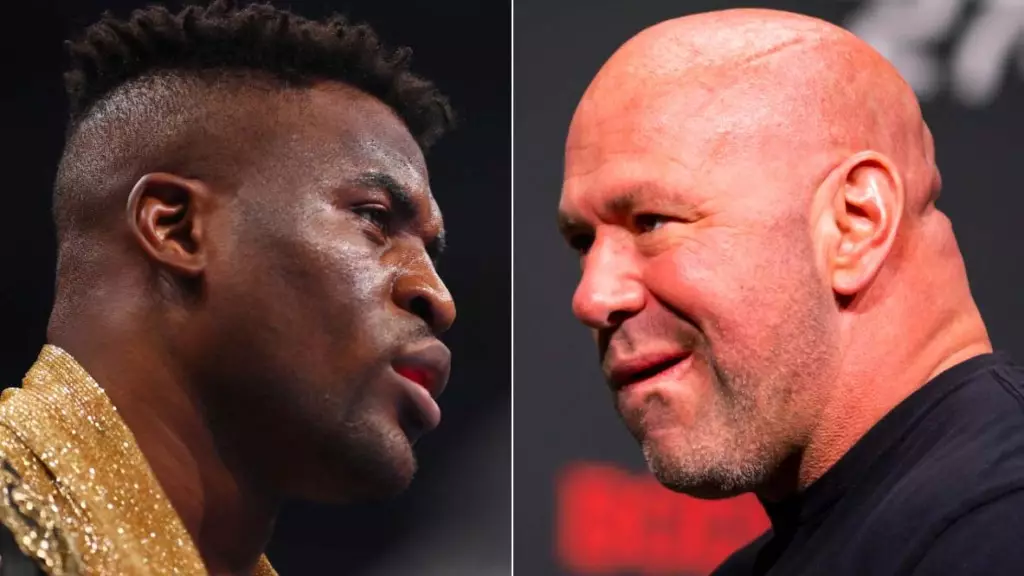The world of Mixed Martial Arts (MMA) has always been rife with high-stakes drama, but the recent exchange between UFC President Dana White and former heavyweight champion Francis Ngannou has put the spotlight on the complexities of fighter promotions, contractual negotiations, and fighter autonomy. Ngannou’s journey led him from being a dominant force in the UFC to a bold foray into free agency, igniting fervor and skepticism regarding both his decisions and White’s responses.
In the aftermath of Ngannou’s victory over Renan Ferreira in the Professional Fighters League (PFL): Battle of the Giants, Dana White did not hold back while discussing his take on the heavyweight’s career trajectory. Rather than praising Ngannou for his performance, White leaned into his long-standing narrative that Ngannou left the UFC primarily for financial gain, citing fears of a potential loss to Jon Jones as a pivotal reason. This kind of assertion raises fundamental questions about the obligations of promotion heads to their fighters and whether White’s comments are grounded in truth or part of a larger power play.
Ngannou’s decision to leave the UFC and pursue boxing fights against prominent names such as Tyson Fury and Anthony Joshua was described by White as indicative of his priorities—namely, a focus on financial opportunities rather than legacy and competition. White’s comments reflect a broader trend in MMA where fighters increasingly seek financial security, challenging the traditional norms that prioritize title reigns and in-cage rivalries over economic prosperity.
Interestingly, Ngannou has contested White’s assertions about his financial situation, claiming he would have earned more if he had stayed with the UFC. His willingness to present hard financial data suggests friction not just in philosophy but also in the business practices of fighting promotions. Insisting that fighters should have a transparent understanding of their earnings relative to promotional revenues delves into a crucial aspect of MMA: how fighters are compensated versus the financial health of the promotions they fight for.
White’s recounting of the time he considered cutting Ngannou after his dual defeats adds another layer of intrigue to their relationship. It raises issues regarding fidelity to a fighter’s development. White’s comments, “I was going to cut Francis when he lost two in a row,” could be viewed as an admission of the fickle nature of fighter treatment in thriving promotions, placing a hefty emphasis on short-term performance rather than long-term potential.
Ngannou’s transition into boxing and further exploration of PFL marks a significant shift in the landscape of combat sports, broadening the definition of what it means to promote oneself as a fighter. By vacating the UFC heavyweight title and stepping into different rings, he has challenged the conventional trajectory of MMA athletes, which typically involves a singular focus on a promotion and its stipulations for title challenges.
It is also crucial to note the replacements for traditional heavyweight contenders. As Ngannou forges a new path, it remains to be seen how this affects the UFC’s heavyweight division, which will need to adapt to his absence. The promotion has a unique responsibility to cultivate new stars while also addressing the financial and competitive disparities that their fighters face.
This back-and-forth between Ngannou and White reflects deeper issues within the MMA community—issues surrounding financial advocacy, fighter autonomy, and promotional obligations. The implications of Ngannou’s departure extend beyond the individual fighter; they prompt broader conversations about the sustainability of fighter pay, career longevity, and the role of promotions in an athlete’s success. As the industry evolves, it will be compelling to see how fighters not only negotiate their worth but also how promotions adapt to this new climate where financial freedom could redefine the very concept of success in combat sports.
Ngannou’s choice to venture outside the UFC is more than a personal decision; it raises critical questions that could reshape the future of mixed martial arts, emphasizing the need for comprehensive discussions on compensation, legacy, and the value fighters bring to the sport.

